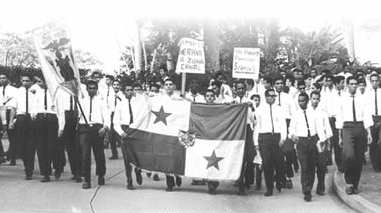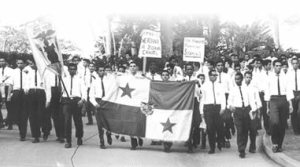
Podcast: Play in new window | Download
Subscribe: RSS
 January 9, 2014 – Segment 1
January 9, 2014 – Segment 1
Marc looks back at some of the events that happened today in history, including Panama’s Martyrs’ Day, the last battle of the American Indian Wars, and the day drummer Cozy Cole died.
HOLIDAYS
Martyrs’ Day, a Panamanian holiday which commemorates the January 9, 1964 riots over sovereignty of the Panama Canal Zone. The riot started after a Panamanian flag was torn during conflict between Panamanian students and Canal Zone Police officers, over the right of the Panamanian flag to be flown alongside the U.S. flag. U.S. Army units became involved in suppressing the violence after Canal Zone police were overwhelmed, and after three days of fighting, about 21 Panamanians and four U.S. soldiers were killed. The incident is considered to be a significant factor in the U.S. decision to transfer control of the Canal Zone to Panama through the 1977 Torrijos–Carter Treaties.
Feast of the Black Nazarene (Manila, Philippines) – The Black Nazarene is a life-sized, dark wooden sculpture of Jesus Christ carrying the cross, and is believed to be miraculous by many Filipino Catholics. The procession on the 9 January feast commemorates the image’s Traslación (English: “passage” or “transfer”), or solemn transfer to the Minor Basilica.
EVENTS
1349 – The Jewish population of Basel, Switzerland, believed by the residents to be the cause of the ongoing Black Death, is rounded up and incinerated.
1431 – Judges’ investigations for the trial of Joan of Arc begin in Rouen, France, the seat of the English occupation government.
1788 – Connecticut becomes the fifth state to be admitted to the United States.
1789: The treaty with 6 different nations, which is signed today, refers back to the treaty signed on January 21, 1785. Two Indians will be held as hostages until prisoners held by the Indians are returned. New tribal boundary lines will be established. The Indians will be able to hunt in the lands which are ceded in this treaty, if they do so peacefully. The governor of the Northwest Territory must issue all trade licenses for trade with the Indians. No U.S. citizens will be allowed to live on Indian lands, without the Indians approval. Lands set aside for trading posts in the earlier treaty are confirmed. Signed by 28 Indians, and General Arthur St.Claire at Fort Harmar, near present day Marietta, Ohio.
1793 – Jean-Pierre Blanchard becomes the first person to fly in a balloon in the United States.
1822 – The Portuguese prince Pedro I of Brazil decides to stay in Brazil against the orders of the Portuguese King João VI, beginning the Brazilian independence process.
1839 – The French Academy of Sciences announces the Daguerreotype photography process.
1843: Today, all of Pascofa’s APALACHICOLA “SEMINOLEs” (they were really CREEKs who had fled the creek wars and joined the SEMINOLEs) will surrender to Col.Ethan Hitchcock. This will bring an end to this seminole war. The group will include a total of 50 people.
1861 – American Civil War: The “Star of the West” incident occurs near Charleston, South Carolina. It is considered by some historians to be the “First Shots of the American Civil War”.
1861 – Mississippi becomes the second state to secede from the Union before the outbreak of the American Civil War.
1866 – Lincoln College in Jefferson City, MO, and Fisk University in Nashville, TN, were founded
1880 – The Great Gale of 1880 devastates parts of Oregon and Washington with high winds and heavy snow.
1894 – New England Telephone and Telegraph installs the first battery-operated telephone switchboard in Lexington, Massachusetts.
1900 – First railway train runs on the Cairo to Khartoum line through the Sudan.
1914 – Phi Beta Sigma Fraternity Inc., the first historically black intercollegiate Greek-letter fraternity to be officially recognized at Howard University, is founded.
1918 – A Mediation Commission appointed by President Woodrow Wilson finds that “industry’s failure to deal with unions” is the prime reason for labor strife in war industries
1918 – Battle of Bear Valley: The last battle of the American Indian Wars.
1922 – Eighty thousand Chicago construction workers strike
1923 – Lithuanian residents of the Memel Territory rebel against the League of Nations’ decision to leave the area as a mandated region under French control.
1937 – Racially mixed marriages are banned by Italy in its North African colonies.
1939 – Southern Tenant Farmers’ Union leads Missouri Highway sit-down of 1,700 families. They had been evicted from their homes so landowners wouldn’t have to share government crop subsidy payments with them
1941: Sammy Kaye records the song “Until Tomorrow” with his orchestra. The song goes on to be a big hit
1954 – Former Hawaii Territorial Gov. Ingram Steinbeck opposes statehood for Hawaii, saying left wing unions have an “economic stranglehold” on the islands. Hawaii was to be granted statehood five years later
1955, Rosemary Clooney was at No.1 on the UK singles chart with ‘Mambo Italiano’ the singers second No.1. The song was banned by all ABC owned stations in the US because it “did not reach standards of good taste”.
1960 – President of Egypt Gamal Abdel Nasser opens construction on the Aswan Dam by detonating ten tons of dynamite to demolish twenty tons of granite on the east bank of the Nile.
1967 – Chairman of the House Education and Welfare Committee, Rep. Adam Clayton Powell, Jr., was ousted from his position after he was charged with wrongfully appropriating congressional funds on this date in 1967. Powell accused his critics of racism.
1967 – Georgia legislature, bowing to legal decisions and national pressure, seated Rep. Julian Bond, a critic of the Vietnam War.
1976, Queen were at No.1 on the UK singles chart with ‘Bohemian Rhapsody’. The single enjoyed a nine week run on the chart selling more than a million copies by the end of the month. It reached No.1 again in 1991 for five weeks following Mercury’s death, eventually becoming the UK’s third best selling single of all time.
1977 – Alvin Ailey, talented dancer, choreographer, and artistic director, received the 61st NAACP Spingarn Medal on this date in 1977 for the development of his world-class dance company and for using quality and virility to establish world pre-eminence.
1989 – Time, Inc. agrees to sell NYT Cable for $420 million, to a group led by J. Bruce Llewellyn, the largest cable TV acquisition by an African American
1991 – Representatives from the United States and Iraq meet at the Geneva Peace Conference to try to find a peaceful resolution to the Iraqi invasion of Kuwait.
1992 – The Assembly of the Serb People in Bosnia and Herzegovina proclaims the creation of Republika Srpska, a new state within Yugoslavia.
1996 – First Chechen War: Chechen separatists launch a raid against the helicopter airfield and later a civilian hospital in the city of Kizlyar in the neighboring Dagestan, which turns into a massive hostage crisis involving thousands of civilians.
2003 – The administration of George W. Bush declares federal airport security screeners will not be allowed to unionize so as not to “complicate” the war on terrorism. The decision was challenged and eventually overturned after Bush left office
2004 – An inflatable boat carrying illegal Albanian emigrants stalls near the Karaburun Peninsula while on the way to Brindisi, Italy; exposure to the elements kills 28.
2005 – Mahmoud Abbas wins the election to replace Yasser Arafat as President of the Palestinian National Authority. He replaces interim president Rawhi Fattouh.
2005 – The Sudan People’s Liberation Movement and the Government of Sudan sign the Comprehensive Peace Agreement to end the Second Sudanese Civil War.
2007 – Apple CEO Steve Jobs unveils the first iPhone.
2011 – Iran Air Flight 277 crashes near Orumiyeh in the northeast of the country, killing 77 people.
BIRTHS
1856 – Lizette Woodworth Reese (January 9, 1856 – December 17, 1935) was an American poet. Born in the Waverly section of Baltimore, Maryland, she was a school teacher from 1873 to 1918. During the 1920s, she became a prominent literary figure, receiving critical praise and recognition, in particular from H. L. Mencken, himself from Baltimore. She has been cited as an influence on younger women poets and has been compared to Emily Dickinson.
1857 – Anna Kuliscioff was a Jewish Russian revolutionary, a prominent feminist, an anarchist influenced by Mikhail Bakunin, and eventually a Marxist socialist militant; she was mainly active in Italy, where she was one of the first women graduated in Medicine.
1857 – Elizabeth Gertrude Britton (January 9, 1857 – February 25, 1934) was an American botanist, bryologist and educator born in New York City. She and her husband, Nathaniel Lord Britton played a significant role in the fundraising and creation of the New York Botanical Garden.
1859 – Carrie Chapman Catt, American activist, founded the League of Women Voters and International Alliance of Women (d. 1947)
1870 – Joseph Strauss, American engineer, co-designed the Golden Gate Bridge (d. 1938)
1908: Simone de Beauvoir born (philosopher, feminist, novelist) She is best known for her novels, including She Came to Stay and The Mandarins, as well as her 1949 treatise The Second Sex, a detailed analysis of women’s oppression and a foundational tract of contemporary feminism.
1913 – Richard Nixon, American politician, 37th President of the United States (d. 1994)
1914 – Kenny Clarke, American drummer and composer (Modern Jazz Quartet) (d. 1985)
1922 – Ahmed Sekou Toure, first president of Guinea, born.
1929, Born on this day, Bill Cowsill, The Cowsills, (1967 US No.2 single ‘The Rain, The Park & Other Things’, 1969 US No.2 single the theme from ‘Hair’). TV’s Partridge Family was based on The Cowsills family.
1935 – Earl G. Graves, Sr., American businessman and publisher, founded Black Enterprise Magazine
1941, Born on this day, Joan Baez, US folk rock singer, songwriter, (1971 US No.3 & UK No.6 single ‘The Night They Drove Old Dixie Down’).
1944, Born on this day, Jimmy Page, guitarist and producer, member of the Yardbirds and Led Zeppelin who had the 1969 US No.4 single Whole Lotta Love. The bands fourth album released in 1971 featuring the rock classic Stairway To Heaven has sold over 37 million copies. Formed The Honeydrippers, (with Robert Plant, Jeff Beck & Nile Rodgers) who had the 1984 US No.3 single Sea Of Love. As a session guitarist in the 60s Page played on Here Comes The Night by Them, Shout by Lulu and The Who’s Can’t Explain.
1959 – Rigoberta Menchú, Guatemalan activist, Nobel Prize laureate. Menchú has dedicated her life to publicizing the plight of Guatemala’s indigenous peoples during and after the Guatemalan Civil War (1960–1996), and to promoting indigenous rights in the country. She received the 1992 Nobel Peace Prize and Prince of Asturias Award in 1998.
DEATHS
1324 – Marco Polo, Italian merchant and explorer (b. 1254)
1848 – Caroline Lucretia Herschel (16 March 1750 – 9 January 1848) was a German-British astronomer and the sister of astronomer Sir William Herschel with whom she worked throughout both of their careers. Her most significant contribution to astronomy was the discovery of several comets and in particular the periodic comet 35P/Herschel-Rigollet, which bears her name.
1901 – Edward Mitchell Bannister, artist, dies
1946 – Countee Cullen, poet, died on this date in 1946. Cullen was a major contributor to the “Harlem Renaissance.” Cullen was a 42-year-old French teacher at a Harlem public school at the time of his death.
1976 – Lester B. Granger, a former National Urban League Director, died in Alexandria, LA
1981 – Cozy Cole, American drummer (b. 1909)
Sources: The People History; Wikipedia List of Historical Anniversaries; This Day in Women’s History; This Day in Jewish History; This Day in African History;History.com; History Orb; Yenoba; Phil Konstantin’s North American Indian History; and This Day in Music




